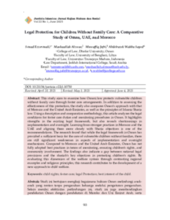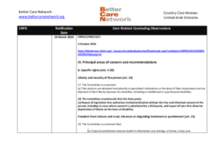Displaying 1 - 7 of 7
This study analyzes how Omani law protects vulnerable children without family care through foster arrangements, comparing it with practices in Morocco, the UAE, and the principles of Islamic Sharia law. While Oman’s legal framework provides a foundation for care, the research highlights weaknesses in implementation and oversight, recommending stronger monitoring, greater community involvement, and closer alignment with both regional best practices and Sharia objectives.
This article provides a review of indicators of child well-being in the six Gulf countries (Bahrain, Kuwait, Oman, Qatar, Saudi Arabia, and the United Arab Emirates), focusing on well-being in six domains: physical health, behavioral adjustment, psychological well-being, social relationships, safety, and cognitive well-being. The article highlights children's participation in decisions affecting their lives, relationships with parents and caregivers, and protection from abuse and neglect, among other indicators.
A nine-year old boy has become "trapped in an orphanage" in the United Arab Emirates following the separation of his parents, according to this article from the Times.
This country care review includes the care-related Concluding Observations adopted by the Committee on the Rights of Persons with Disabilities during the sixteenth session (15 Aug 2016 – 2 Sept 2016) of the Convention on the Rights of Persons with Disabilities.
Aysha Albusmait, a single woman in her 50s living in Dubai, adopted a young girl named Reem when Reem was 3 years old. Her actions, say the article, are helping to break down taboos around adoption in the Gulf region.
This article from AlJazeera tells the story of Aysha Albusmait, a single woman in Dubai who adopted a young girl.
This article reports on delays in the implementation of a two-year-old law aimed at caring for orphans in the United Arab Emirates apparently linked to the delayed construction of a new and expanded shelter.


